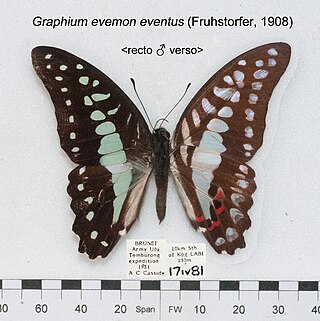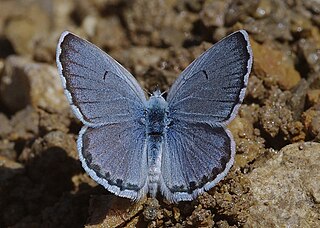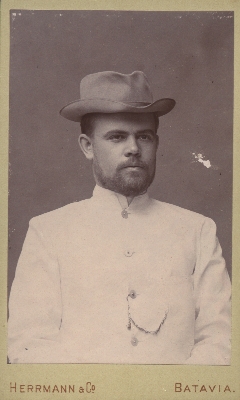
The holly blue is a butterfly that belongs to the lycaenids or blues family and is native to the Palearctic.

Papilio polytes, the common Mormon, is a common species of swallowtail butterfly widely distributed across Asia.

The Charaxinae, the leafwings, are a nymphalid subfamily of butterflies that includes about 400 species, inhabiting mainly the tropics, although some species extend into temperate regions in North America, Europe, China, and southern Australia. Significant variations exist between the species. For example, some are medium sized and bright orange above, but mottled gray or brown below. This underwing coloration helps them resemble a dead leaf when they are at rest, as they keep their wings closed. With relatively few exceptions, the hindwings of the members of this subfamily have jagged edges.

Graphium doson, the common jay, is a black, tropical papilionid (swallowtail) butterfly with pale blue semi-transparent central wing bands that are formed by large spots. There is a marginal series of smaller spots. The underside of wings is brown with markings similar to upperside but whitish in colour. The sexes look alike. The species was first described by father and son entomologists Cajetan and Rudolf Felder.

Graphium megarus, the spotted zebra, is a species of swallowtail butterfly found in Southeast Asia. It is common and not considered to be threatened; however, the nominate subspecies is protected by law in India.

Graphium evemon, the blue jay, lesser jay, or pale green triangle is a species of tropical butterfly found in India, Indonesia, and Malaysia.

Atrophaneura aidoneus, the lesser batwing, is an Asian species of butterfly that belongs to the batwings group of Atrophaneura, comprising tailless black swallowtail butterflies.

Parnassius delphius, the banded Apollo, is a high-altitude butterfly which is found in Central Asia. It is a member of the genus Parnassius of the swallowtail family, Papilionidae.

Parnassius actius, also known as the scarce red apollo, is a high-altitude butterfly found in Central Asia. It is a member of the snow Apollo genus (Parnassius) of the swallowtail family (Papilionidae).

Tarucus nara, the striped Pierrot, is a small butterfly found in Sri Lanka and south India that belongs to the lycaenids or blues family.

Idea is a genus of butterflies known as tree nymphs or paper butterflies. The member species are concentrated around South-East Asia. See Sevenia for the genus of African tree nymphs. These slender butterflies have very large, papery white wings with black veins and markings. They stay high up in the treetops where they flap around in slow flight. Like most other monarch butterflies, wood nymphs are poisonous, and the striking colour patterns signal this. Several butterflies from other groups mimic these patterns.

Pseudophilotes vicrama, the eastern baton blue, is a small butterfly found in Asia, east to Tian Shan and parts of China, west to the Balkans, Turkey, eastern Europe to southern Finland. It belongs to the lycaenids or blues family. The species was first described by Frederic Moore in 1865.

Mud-puddling, or simply puddling, is a behaviour most conspicuous in butterflies, but also occurring in other animals, primarily insects. The organism seeks out nutrients in certain moist substances such as rotting plant matter, mud, and carrion, and sucks up the fluid. Where the conditions are suitable, conspicuous insects such as butterflies commonly form aggregations on wet soil, dung, or carrion. From the fluids they obtain salts and amino acids that play various roles in their physiology, ethology, and ecology. This behaviour also has been seen in some other insects like the leafhoppers, e.g. the potato leafhopper, Empoasca fabae.

Papilio ulysses, the Ulysses butterfly, is a large swallowtail butterfly, in the subgenus Achillides, of Australia, Indonesia, Papua New Guinea and the Solomon Islands. Its size varies depending on subspecies, but the wingspan is about 10.5 cm (4.1 in) in Queensland.

Friedrich Joseph Adalbert Seitz, was a German physician and entomologist who specialised in Lepidoptera. He was a director of the Frankfurt zoo from 1893 to 1908 and is best known for editing the multivolume reference on the butterflies and larger moths of the world Die Gross-Schmetterlinge der Erde which continued after his death.

Hans Fruhstorfer was a German explorer, insect and shell trader and entomologist who specialised in Lepidoptera. He collected and described new species of exotic butterflies, especially in Adalbert Seitz's Macrolepidoptera of the World. He is best known for his work on the butterflies of Java.

Prothoe is a genus of charaxine butterflies in the family Nymphalidae. Two of the three species are virtually restricted to western and central Melanesia, but the most widespread species, P. franck, occurs throughout a large part of South-East Asia and as far northwest as Assam in India.

Amblopala is a Palearctic and Indomalayan butterfly genus in the family Lycaenidae. The genus is monotypic containing the single species Amblopala avidiena the Chinese hairstreak. It is a small butterfly found in the Naga Hills of India and in China



















